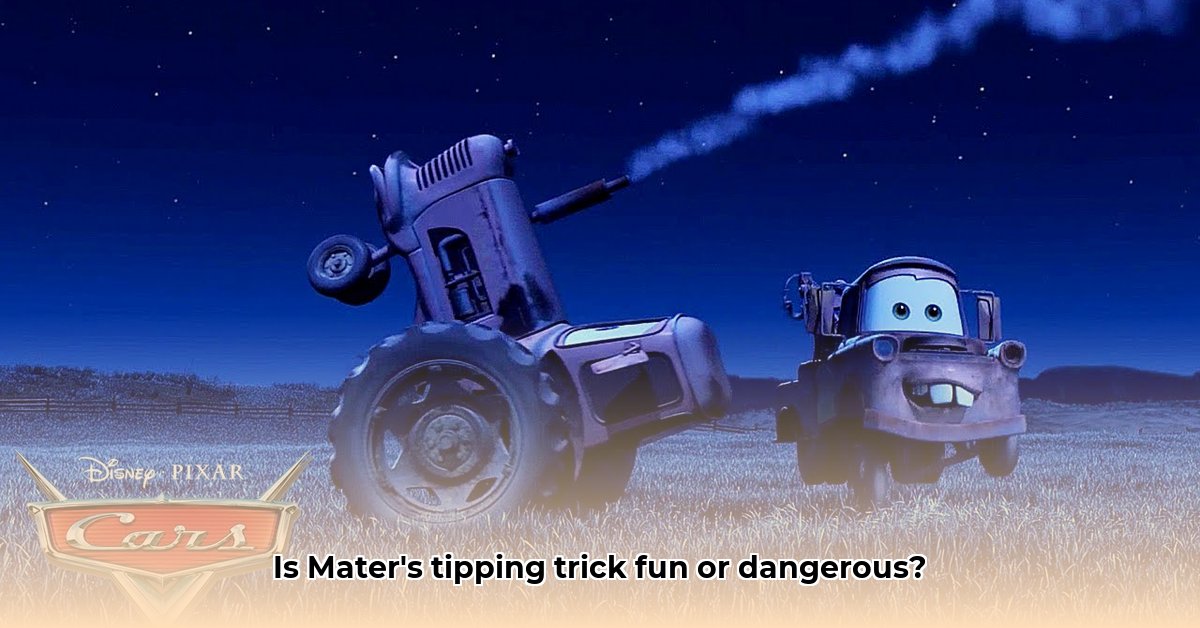
Mater, the lovable rustbucket tow truck from Pixar's Cars, has a signature move: tipping tractors! It's hilarious, right? But is this just playful cartoon mischief, or does it inadvertently send a message about risk and responsibility to young viewers? Let's investigate. This isn't about criticizing Pixar; it's about using a beloved film to spark a crucial conversation. You can find more information on this topic by checking out this helpful resource.
Mater's Mischief: A Closer Look
Mater's tractor-tipping isn't a one-off gag. It's a recurring theme throughout the Cars franchise. This repetition begs the question: is it simply comedic, or is there a deeper narrative at play? Does the repeated action subtly influence how children perceive risk?
Friendship, Fun, and (Maybe) a Little Recklessness
Lightning McQueen is almost always present when Mater tips a tractor. Their friendship is central to the Cars films, and their shared participation in this activity might reflect their playful, adventurous side. Perhaps it signifies a shared willingness to push boundaries – within the safe confines of cartoon logic, of course.
Laughter, Silliness, and Safety Concerns
The films present Mater's antics as purely comedic. The sheer silliness is undeniably funny. However, the significant absence of any safety warnings is where the issue arises. Does this omission inadvertently minimize the inherent risks involved? Should there be a balance between fun and responsibility, even in a children's movie?
The Impact on Young Viewers: A Crucial Consideration
Young children often imitate what they see on screen. Could Mater's actions unintentionally downplay the real-world dangers of handling heavy machinery? Might it subtly suggest that such actions are harmless? This is a vital question for parents and child development experts alike. Isn't it a little concerning that this very common scene might influence children's perception of a potentially dangerous activity?
A Balancing Act: Fun and Responsibility
This isn't about censoring the fun of Cars; it's about responsible storytelling. Future installments could subtly introduce age-appropriate messages about farm safety. Imagine a scene where Mater learns about safe tractor operation, perhaps even assisting a farmer. A simple, well-placed scene could make a significant difference.
Analyzing the Risk: From Cartoon to Reality
The stark difference between the cartoon world and real-life scenarios is crucial.
| Activity | Likelihood of Harm | Severity of Harm | Risk Level |
|---|---|---|---|
| Tipping a tractor (real life) | High | High | Very High |
| Imitating Mater's actions | Moderate | Low to Moderate | Moderate |
This clearly illustrates that the perceived risk in the cartoon is far lower than the actual risk in real life. This difference is something parents should openly discuss with their children.
The Continuing Conversation: Mater, Tractors, and Beyond
Mater's actions spark a wider discussion about the responsibility of filmmakers and the impact of children's media on young viewers. It's not just about a funny scene; it's about responsible entertainment and media literacy. The conversation continues, with ongoing research exploring the long-term effects of media portrayals on children's risk perception. This is a situation that requires ongoing observation and discussion.
A Parent's Guide: Talking Tractor Safety
Here's how to address tractor tipping safety with children after watching Cars:
- Acknowledge the humor: Start by saying, "That was funny, wasn't it?"
- Introduce the reality: Gently explain, "But real tractors are dangerous."
- Use relatable examples: Compare it to something kids understand, like climbing trees.
- Emphasize safety: Explain that adults need to operate heavy machinery carefully.
- Make it interactive: Ask questions and engage them in conversation.
Beyond the Screen: A Call to Action
Pixar has a unique opportunity to subtly reinforce safety messages. A scene showing Mater learning about tractor safety (in a humorous way, of course!) could make a significant difference. Even a short, online educational video could be highly impactful. The potential for positive influence is considerable.